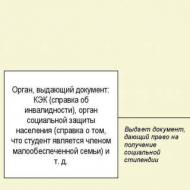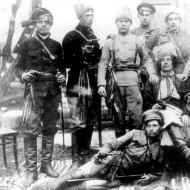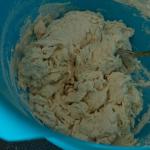
Упражнения на пассивный залог во времени "Present Perfect". Пассивный залог. Упражнения Past perfect passive voice упражнения
Для совершенного обладания английским недостаточно выучить использование только 12 времен действительного залога. В быту иногда приходится сталкиваться с ситуациями, когда, например, нам неизвестно лицо, которое осуществляло действие, но мы хотим рассказать о произошедших событиях. Как тогда их выразить? Для таких случаев англичане используют passive voice, что в переводе на русский означает пассивный, или по-другому страдательный, залог. Сегодня мы разберем одно из встречающихся в речи и текстах его направлений – past perfect passive. Узнаем, как образуются конструкции этого времени и отработаем навык их использования, выполняя тематические упражнения.
Зачем употреблять страдательный залог?
Изучая английский язык в теории, до поры до времени изучающим не приходится встречать в текстах или речи пассивный залог. Но, когда человек достигает среднего уровня знаний английского и переходит к самостоятельному чтению газет, журналов и книг, он сразу наталкивается в текстах на эту конструкцию. Различают несколько типичных случаев употребления сказуемых в неактивной форме. Рассмотрим их.
Страдательный залог используется, когда говорящий хочет подчеркнуть значимость событий/действий, а не лица, их совершившего. На первый план при этом выставляют объект, над которым и выполняется само действие.
- Olga has done all exercises – Ольга выполнила все упражнения (акцент на лицо, выполнившее действия).
- All exercises have been done by Olga – Все упражнения были выполнены Ольгой (важен факт совершения действий).
Невозможно обойтись без употребления passive voice в случаях, когда не удается точно определить исполнителя действий.
- This store sends emails every week – Этот магазин присылает электронные письма каждую неделю. (лицо известно)
- These emails are sent every week – Эти электронные письма присылают каждую неделю (неизвестно кто)
Также, страдательный залог часто встречается в СМИ и официальной речи, например, при обсуждении негативных последствий событий, в которых некого винить или же виновника не хотят называть. Кроме того, такие конструкции употребляют для придания высказыванию вежливого и нейтрального оттенка.
- His election campaign was failed – Его избирательная компания была провалена.
- Your request wasn ’t processed yesterday but it will be processed today – Ваш запрос не был обработан вчера, но он будет обработан сегодня.
Как видно из приведенных примеров, пассивная форма может применяться не только в past perfect passive, но и практически в любых временах, кроме продолженного будущего и совершенного продолженного (Future/Perfect Progressive). Если необходимо описать процесс действия, следует воспользоваться страдательными формами времен Present/Past Continuous или вовсе поставить предложение в действительный залог. Все виды страдательных конструкций сразу рассмотреть невозможно, поэтому сегодня изучим только одну временную группу.
Пассивный залог этого времени имеет такое же значение, как и действительный – показать завершенность одного действия прежде, или в момент, начала/происхождения другого. Употребляются такие предложения, конечно, не так часто как формы настоящего и прошедшего времени, но порой встречаются и в текстах, и в разговорной речи. Рассмотрим подробнее правила их построения, которые помогут нам позже верно выполнить практические упражнения.
Конструкция сказуемого прошедшего совершенного времени в passive voice складывается из трех основных частей: вспомогательного глагола have в прошедшем времени, соответствующей формы глагола to be и причастия II. Обобщенная схема выглядит следующим образом.
The fax (1) had been (2) sent (3) before the boss came at the office (4) – Факс был отправлен до того, как в офис пришел начальник.
Вопросительная и отрицательная формы страдательного залога этой группы времени образуются при помощи вспомогательного слова had. При создании вопроса эту частичку просто выносят вперед.
Had (1) work (2) been (3) finished (4) by that time (5) ? – Работа была закончена к тому времени?
Для постановки отрицания берут конструкцию утверждения и просто добавляют к had отрицательное слово not.
The letter (1) hadn ’t been (2) written (3) yet when I returned home (4) – Письмо еще не было написано, когда я вернулся домой.
Встречаются случаи, когда употребляют вопросительную форму с отрицанием. Это необходимо, например, если мы хотим уточнить, действительно ли что-то не было сделано. Для такой ситуации схема будет иметь следующий вид.
Had (1) the letter (2) not been (3) written (4) when you returned home (5)? – Письмо не было написано, когда ты вернулся домой?
Обратите внимание, что при построении отрицательного вопроса, not остается по соседству с been, а не следует в начало предложения за had.
Для запоминания правил и отработки построения конструкций, приведем примеры предложений во всех возможных вариациях.
Действия субъекта (Действительный залог) | Действия к объекту (Пассивная форма) |
| Alice had cooked the lunch
by 12 o’clock. Алиса приготовила обед к 12 часам. | The lunch had been cooked
by 12 o’clock. Обед был приготовлен к 12 часам. |
| Had he not painted the picture
when the father came? Он не дорисовал картину, когда пришел отец? | Had the picture not been painted
when the father came? Картина не была дорисована, когда пришел отец? |
| Nobody had translated this book
Никто не перевел эту книгу на японский язык до тех пор, пока я это не сделал. | This book hadn’t been translated
into the Japanese language until I did it. Эта книга не была переведена на японский язык до тех пор, пока я не сделал это. |
| What time had you closed the doors
that day? В какое время вы закрыли двери в тот день? | What time had the doors been closed
that day? В какое время в тот день закрыли двери? |
| I hadn’t washed my car
by 5 o’clock. Я не помыл свою машину к 5 часам. | My car hadn’t been washed
by 5 o’clock. Машина не была вымыта к 5 часам. |
| Actors of this theatre had played «Hamlet»
for 7 month before they won the award. Актеры этого театра играли «Гамлета» в течение 7 месяцев, прежде чем они выиграли эту премию . | “Hamlet” had been played
in this theatre for 7 month before it won the award. «Гамлета» играли в этом театре в течение 7 месяцев, прежде чем спектакль заслужил эту награду. |
| Had they repaired your computer
by Sunday? Они починили твой компьютер к воскресенью? | Had your computer been repaired
by Sunday? Твой компьютер был починен к воскресенью? |
Мы проработали основные виды речевых конструкций времени паст перфект, в которых можно встретить употребление passive voice. Настало время и проверить свои силы в выполнении различных заданий. Желаем вам успешно завершить все упражнения!
Просмотры: 207
В данной статье приведен пример преобразования формы активного залога Future Perfect в форму пассивного залога. Для выполнения данной задачи нам необходимо воспользоваться структурной схемой утвердительного предложения времени Future Perfect :
Subject
+ will have
+ Verb III form
+ Object
Подлежащее
+ will have
+ Глагол III формы
+ Object
Преобразование в пассивную форму начнем с замены смыслового глагола следующей синтаксической конструкцией:
to be + V III form
Данная конструкция говорит нам, что мы должны преобразовать вспомогательный глагол to be в ту форму, в которой стоит смысловой глагол в предложении исходного активного залога. А сам смысловой глагол должен быть преобразован в глагол III формы. Следуя данному правилу, мы преобразуем глагол to be в третью форму – been, а также и смысловой глагол в эту же форму (так как он и так уже находится в третьей форме, то смысловой глагол не меняется). Так же, подлежащее и дополнение меняются местами, т.к. в пасивном залоге меняется направление воздействия с субъекта на объект. В итоге получим следующую структуру, соответствующую пассивному залогу времени Future Perfect в утвердительной форме:
Subject
+ will have been
+ Verb III form
+
Подлежащее
+ will have been
+ Глагол III формы
+
Вопросительная форма:
Will
+ Subject
+ have been
+ Verb III
+ ?
Will
+ Подлежащее
+ have been
+ Глагол III
+ ?
Отрицательная форма:
Subject
+ will
+ not
+ have been
+ Verb III
+
Подлежащее
+ will
+ not
+ have been
+ Глагол III
+
Примеры предложений:
| Active voice | Passive voice |
|---|---|
| Утвердительная форма | |
| She will have finished the performance by 8 o’clock. Она завершит выступление к 8 часам. |
The performance will have been finished by 8 o’clock. Выступление будет завершено к 8 часам. |
| They will have repaired the car by the next week. Они отремонтируют автомобиль к следующей неделе. |
The car will have been repaired by the next week. Автомобиль будет отремонтирован к следующей неделе. |
| I will have made the toy by your birthday. Я сделаю игрушку к твоему дню рождения. |
The toy will have been made by your birthday. Игрушка будет сделана к твоему дню рождения. |
| He will have read the letters by your return. Он прочтет письма к твоему возвращению. |
The letters will have been read by your return. Письма будут прочтены к твоему возвращению. |
| Вопросительная форма | |
| Will she have finished the performance by 8 o’clock? Она завершит выступление к 8 часам? |
Will the performance have been finished by 8 o’clock? Выступление будет завершено к 8 часам? |
| Will they have repaired the car by the next week? Они отремонтируют автомобиль к следующей неделе? |
Will the car have been repaired by the next week? Автомобиль будет отремонтирован к следующей неделе? |
| Will I have made the toy by your birthday? Я сделаю игрушку к твоему дню рождения? |
Will the toy have been made by your birthday? Игрушка будет сделана к твоему дню рождения? |
| Will he have read the letters by your return? Он прочтет письма к твоему возвращению? |
Will the letters have been read by your return? Письма будут прочтены к твоему возвращению? |
| Отрицательная форма | |
| She will not have finished the performance by 8 o’clock. Она не завершит выступление к 8 часам. |
The performance will not have been finished by 8 o’clock. Выступление не будет завершено к 8 часам. |
| They will not have repaired the car by the next week. Они не отремонтируют автомобиль к следующей неделе. |
The car will not have been repaired by the next week. Автомобиль не будет отремонтирован к следующей неделе. |
| I will have not made the toy by your birthday. Я не сделаю игрушку к твоему дню рождения. |
The toy will not have been made by your birthday. Игрушка не будет сделана к твоему дню рождения. |
| He will not have read the letters by your return. Он не прочтет письма к твоему возвращению. |
The letters will not have been read by your return. Письма не будут прочтены к твоему возвращению. |
Упражнения на пассивный залог во времени Present Perfect. Exercises with answers. Полезные разноплановые упражнения на страдательный залог помогут Вам разобраться в данной теме.
Упражнение 1. Read the texts and find the sentences with Present Perfect Active and Present Perfect Passive tense forms. Translate them into your language.
Nina has lived in Sydney for two years. She has done a lot of things in Sydney. She has seen several plays, she has gone to the picture galleries and museums. She has visited the circus as well, and she has taken a tour to the Islands on Port Jackson. However, there are a lot of planned things she hasn’t done yet. She hasn’t gone to the Australian Reptile Park yet. Nina hasn’t been to some other parks yet.
The boss is angry with his secretary today because important letters haven’t been typed yet. Tea has been given to him cold. Wrong telephone numbers have been written down. The mail hasn’t been sent in time. A lot of time has been spent over the telephone.
Упражнение 2. Change the sentences with Present Perfect Active into Present Perfect Passive.
I have already finished my work. My work ...
My work has already been finished.
- I have already taken the books back to the library. The books ...
- She has just posted those letters. Those letters ...
- The teacher has already checked my test. My test ... —
- He has lost the key. The key ...
- We have opened all the windows. All the windows ... "
- I have bought bread on the way home. Bread ...
- I have done this exercise. This exercise ...
Упражнение 3. Imagine that your classroom and the school yard have been thoroughly cleaned. Say what has been done by whom.
Example The windows ... (to wash)
The windows have been washed by the girls.
- The desks ... (to wash)
- The flowers ... (to water)
- The floor ... (to mop)
- The furniture ... (to dust)
- The grass ... (to cut)
- The trees ... (to cut)
Упражнение 4. Answer the questions about your English lesson using Present Perfect Passive.
- Have you been asked to read a text?
- Has the text been translated?
- Have the new words been written down?
- Have the exercises been done by all the pupils?
- Has your friend been asked to recite something?
- Has large homework been given?
- Who has been given good (bad) marks?
- Have you been praised by the teacher?
Упражнение 5. Use Present Perfect Active or Passive of the verbs in brackets to complete the sentences.
- Peter ... (to break) the window.
- The exercise ... (to write) already.
- The text ... (to translate) by Victor.
- The teacher just ... (to explain) the new rule.
- We (to learn) the Passive Voice already.
- A new school ... (to build) in this street.
Упражнение 6. Translate into English using Present Perfect Active or Passive.
- Я только что купил газету
- Телевизор только что выключили.
- Он уже ответил на вопрос
- Слова только что написали на доске
- Мы уже говорили об этом
- Все ответы уже даны.
- Об этом только что сказали по радио.
- Я уже смотрел этот фильм
- Мне ничего об этом не говорили
- Все предложения уже написаны.
Ответы:
Упражнение 1.
All the sentences in text A are in Present Perfect Active.
All the sentences in text B are in Present Perfect Passive.
Упражнение 2.
- The books have been already taken back to the library by me.
- Those letters have just been posted by her.
- My test has already been checked by the teacher.
- The key has been lost by him.
- All the windows have been opened by us.
- Bread has been bought by me on the way home.
- This exercise has been done by me.
Упражнение 3.
- The desks have been washed by the pupils.
- The flowers have been watered by Molly.
- The floor has been mopped by the cleaners.
- The furniture has been dusted by the boys.
- The grass has been cut by the caretaker.
- The trees have been cut by the workmen.
Упражнение 4. Your own answers.
Упражнение 5.
1 has broken, 2 has been already written, 3 has been translated, 4 has just explained, 5 have learnt, 6 has been built
Упражнение 6.
- I have just bought the newspaper.
- The TV-set has just been switched off.
- Не has already answered this question.
- The words have just been written on the blackboard.
- We’ve already spoken about it.
- All the answers have already been given.
- This has been just said over the radio.
- I’ve already watched this film.
- I haven’t been told anything about it.
- All the sentences have already been written.
Упражнения на пассивный залог во времени Present Perfect.
Упражнение 1.
Read the texts and find the sentences with Present Perfect Active and Present Perfect Passive tense forms. Translate them into your language.
Nina has lived in Sydney for two years. She has done a lot of things in Sydney. She has seen several plays, she has gone to the picture galleries and museums. She has visited the circus as well, and she has taken a tour to the Islands on Port Jackson. However, there are a lot of planned things she hasn’t done yet. She hasn’t gone to the Australian Reptile Park yet. Nina hasn’t been to some other parks yet.
The boss is angry with his secretary today because important letters haven’t been typed yet. Tea has been given to him cold. Wrong telephone numbers have been written down. The mail hasn’t been sent in time. A lot of time has been spent over the telephone.
Упражнение 2. Change the sentences with Present Perfect Active into Present Perfect Passive.
Example: I have already finished my work. My work ... - My work has already been finished.
I have already taken the books back to the library. The books ...
She has just posted those letters. Those letters ...
The teacher has already checked my test. My test ...
He has lost the key. The key ...
We have opened all the windows. All the windows ...
I have bought bread on the way home. Bread ...
I have done this exercise. This exercise ...
Упражнение 3. Imagine that your classroom and the school yard have been thoroughly cleaned. Say what has been done by whom.
Example The windows ... (to wash) - The windows have been washed by the girls.
The desks ... (to wash)
The flowers ... (to water)
The floor ... (to mop)
The furniture ... (to dust)
The grass ... (to cut)
The trees ... (to cut)
Упражнение 4. Answer the questions about your English lesson using Present Perfect Passive.
Have you been asked to read a text?
Has the text been translated?
Have the new words been written down?
Have the exercises been done by all the pupils?
Has your friend been asked to recite something?
Has large homework been given?
Who has been given good (bad) marks?
Have you been praised by the teacher?
Упражнение 5. Use Present Perfect Active or Passive of the verbs in brackets to complete the sentences.
Peter ... (to break) the window.
The exercise ... (to write) already.
The text ... (to translate) by Victor.
The teacher just ... (to explain) the new rule.
We (to learn) the Passive Voice already.
A new school ... (to build) in this street.
Упражнение 6. Translate into English using Present Perfect Active or Passive.
Я только что купил газету. 2. Телевизор только что выключили. 3. Он уже ответил на вопрос. 4. Слова только что написали на доске. 5. Мы уже говорили об этом. 6. Все ответы уже даны. 7. Об этом только что сказали по радио. 8.Я уже смотрел этот фильм 9.Мне ничего об этом не говорили. 10.Все предложения уже написаны.
Ответы:
Упражнение 1. All the sentences in text A are in Present Perfect Active. All the sentences in text B are in Present Perfect Passive.
Упражнение 2. The books have been already taken back to the library by me. Those letters have just been posted by her. My test has already been checked by the teacher. The key has been lost by him. All the windows have been opened by us. Bread has been bought by me on the way home. This exercise has been done by me.
Упражнение 3. The desks have been washed by the pupils. The flowers have been watered by Molly. The floor has been mopped by the cleaners. The furniture has been to dusted by the boys. The grass has been to cut by the caretaker. The trees have been cut by the workmen.
Упражнение 4. Your own answers. Упражнение 5. 1 has broken, 2 has been already written, 3 has been translated, 4 has just explained, 5 have learnt, 6 has been built
Упражнение 6. I have just bought the newspaper. The TV-set has just been switched off. Не has already answered this question. The words have just been written on the blackboard. We’ve already spoken about it. All the answers have already been given. This has been just said over the radio. I’ve already watched this film. I haven’t been told anything about it. All the sentences have already been written.
Упр. 65. Прочитайте и переведите предложения на русский язык.
1. No mistakes have been made.
2. The gate has been left open.
3. He will have been sent to school by that time.
4. The dinner had been eaten before they finished the conversation.
5. You will have been given an answer by next week.
6. The building had been destroyed by the fire before the fire brigade arrived.
7. I couldn’t open the box as it had been locked by somebody.
8. The book will have been published by the end of the year.
9. I’ve just been offered the ticket for the film.
10. Pushkin’s works have been translated into many languages.
Упр. 66. Переделайте предложения из активного в пассивный залог.
Example: They have discussed the question. - The question has been discussed.
1. The child has broken the crystal vase.
2. The gardener has planted some trees.
3. She hasn’t cleaned the rooms for weeks.
4. Have the boys broken the window?
5. They haven’t invited Nick to the party.
6. The company has sacked 100 people.
7. The police have accused several people of the theft.
2. They have taken her to hospital.
3. Somebody has split tea all over the tablecloth.
4. Has someone mended the chair yet?
5. Nobody has ever spoken to me like that.
6. I haven’t washed the floor yet.
7. I have cut my finger.
8. The orchestra has played that piece beautifully.
10. They will have translated the article by next week.
11. They will have packed the things by the evening.
Упр. 67. Когда ученики вернулись в школу после летних каникул, они заметили,
что многое изменилось. Поставьте глаголы в скобках в Past Perfect Passive .
New desks ___ had been bought ______________________ (buy).
1 A lot of trees ____________________________________(plant).
2 New lights ______________________________________(put in).
3 The classrooms ___________________________________(paint).
4 A tennis court ____________________________________(build).
5 The fence ________________________________________(take down).
6 Five new classrooms ________________________________(add).
7 New equipment __________________________(buy) for the chemistry lab.
8 Showers __________________________(install) in the changing rooms.
9 New blackboards __________________________(put up) in the classrooms.
10 The whole school ________________________________(modernize).
Упр . 68. Как вы думаете, что произойдет или еще не произойдет к 2020 году? Употребите глаголы в Future Perfect Passive.
Begin: I think… or I don’t think. . . . Use find, introduce, invent and solve.
Example: I don’t think the drug problem will have been solved.
|
the drug problem a cure for cancer passenger transport to the moon the world’s hunger problem supersonic trains new energy source the problem of world peace |
Упр. 69. Переделайте предложения из активного в пассивный залог. Обращайте
внимание на видо - временные формы глаголов .
1. The customs officer is counting the cases.
2. When he entered the kitchen his sister was cooking supper.
3. After the accident they took him to hospital.
4. They will have completed this work by the end of the month.
5. The secretary has just brought some new magazines.
6. My son has cut his finger to the bone.
7. They wrote that letter in ink.
8. They are discussing a very important question now.
9. The porter will bring your luggage to your room.
10. They offered her an interesting job.
11. The organizers will exhibit the paintings till the end of August.
12. The author has written a special edition for women.
13. I have bought a piano. They are delivering it tomorrow.
14. A thief stole my cat. I offered him $10 reward.
15. When we returned they had already locked the door.
16. I want to call the police because somebody has stolen my watch.
17. They will have built a new school by September.
18. They speak English here.
19. We will finish this work in time.
20. The secretary had typed the contract before the director came to the office.
21. The manager hasn’t signed the documents yet. He is checking them now.
22. A famous architect designed this theatre.
23. The teacher will correct the student’s composition.
24. Someone will serve coffee.
25. In some districts farmers use pigs to find truffles.
26. Glinka composed the opera “Ivan Susanin”.
27. A railway line connects the village with the town.
28. The director has just signed the letter.
29. They are building many new houses in our town now.
30. They built this bridge in 1945.
31. The manager hasn’t signed the documents yet. He is checking them now.
32. They sell these books everywhere.
33. Helen washed the dishes.
34. By the middle of autumn we had planted all the trees.
35. They haven’t brought back my skates.
36. Bees gather honey from flowers.
37. They make Toyotas in Japan.
38. They invited two hundred people to the wedding.
39. I have told the children about the party.
40. They promised the workers higher wages.
41. They will allow each boy a second plate of ice-cream.
42. They had already offered me a new job at the bank.
43. She will give you the answer in a week.
44. They make these artificial flowers of silk.
45. They took the photographs after the ceremony.
46. Has anyone posted my parcel?















